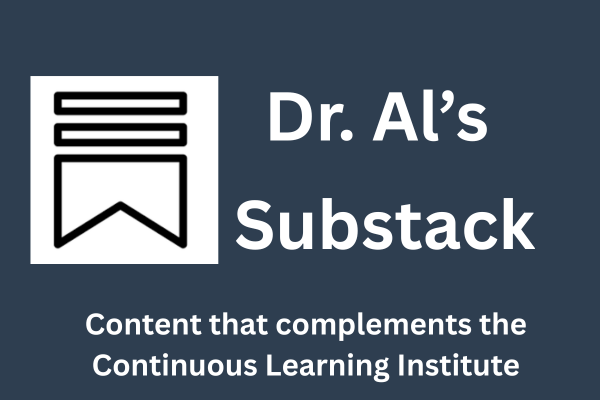Student Success & Equity with Dr. Gina Garcia

LISTEN TO THE EPISODE:
Learn to improve student success & equity by implementing and measuring "servingness."
In this episode, I interview Dr. Gina Ann Garcia, associate professor of higher education at the Department of Educational Foundations, Organizations and Policy at the University of Pittsburgh.
(Scroll down to access the transcript.)
We discuss the following topics:
3:25:21: The connection between fitness training and teaching.
6:04:02: Rethinking the outcomes approach to U.S. Dept. of Ed Title V and III grant writing/planning and implementation.
Resource mentioned:
Dr. Nolan Cabrera, University of Arizona
Banned Mexican-American Studies Curriculum Boosted Student Achievement
14:39:05: Critical Consciousness Development: The outcome that's needed to increase student success measures of retention and graduation.
- Defining critical consciousness
- Measuring critical consciousness
21:50:16: Ethnic studies programs are critical, but...
- Social justice in the curriculum in colleges and universities must be multi-dimensional and applied across the institution.
- Example with Flint, Michigan water crisis and how it can be applied as a social and/or environmental justice approach across disciplines such as chemistry, biology, engineering, public health, etc. Use a regional-based approach to help students learn about their community.
Resource mentioned:
Dr. Gina Garcia, Defining Social Justice Curriculum in Postsecondary Education
34:23:07: Fear of minoritized groups. Creating allies in the equity work in an atmosphere of fear.
- Reality check: An educator from a minoritzed background doesn't guarantee a push for equity, racial equity in particular, because they tend to have a false attachment to meritocracy. Hiring for diversity alone is insufficient. Their thinking around equity and justice is key.
Resource mentioned:
NPR's Michel Martin interviews University of Chicago research PI, Dr. Robert Pape. The research findings from the 400+ arrested insurrectionists demonstrates their key driver regardless of their income status: fear of being replaced by minoritized groups.
Video: The Single Biggest Motivation for the Jan. 6th Insurrectionists
41:41:13: Reasons to be optimistic about equity work.
- Institutional change makers
- Engaging the student voice
Resource mentioned:
Dr. Adrianna Kezar's grass roots leaders in higher ed research
Select Dr. Garcia quotes:
"I don't like the use of 'nonacademic' outcomes in the 'servingness' model anymore because I feel like all of the things we do in college are academic. For example, being involved in student organizations--that's an academic endeavor. Being part of the community is an academic endeavor. These are academic activities that lead to academic outcomes."
"Critical consciousness is grounded in various dimensions, one is an understanding of social historic ways in which people have become oppressed. Being aware of your social historical positioning in the world is part of critical consciousness. That's an important piece for us to think about when students arrive in college--that they're critically conscious is a false assumption. We would assume that [students'] primary and secondary education actually gave them that. And if they did, awesome. But it doesn't. We know primary and secondary schools are not teaching critical consciousness development. We're seeing this debate unfold right in front of us about critical race theory and teaching students about their own history."
"Some are scared that if people [of color] are too conscious, then there's going to be a revolution. That we're all going to overturn the government or something because now we're all conscious. That this wild fear, that black and brown people are going to become critically conscious and start to go wild or something. We're not going to go wild at all. We're going to push for greater change. We're going to push for better policy, better outcomes."
"Understanding historically how you came to be, where you are in the world, whatever your minoritized identity, is an important piece of critical consciousness. Why are we so afraid of gay people, of trans people, of trans students? Why are they experiencing oppression and discrimination in our colleges and universities? There's a long history of that. Understanding that history in order to come to understand your own identity is part of the critical consciousness...There's evidence, in particularly in college and development literature, that shows that students who have spent time grappling with their identity and being engaged in certain organizations that allow them to do that actually leads to greater retention and outcomes."
"We've spent so much time on diversity in higher ed. That wasn't the best approach. I don't think we were pushing for equity. We haven't been pushing for social justice. We've been pushing for diversity, which is compositionally already present at [many HSI institutions]. But we haven't gotten into the social justice within curriculum approach yet.
About Dr. Gina Ann Garcia
Dr. Garcia is an associate professor in the Department of Educational Foundations, Organizations and Policy at the University of Pittsburgh, where she teaches master's and doctoral students pursuing degrees in higher education and student affairs. Her research centers on issues of equity and justice in higher education, with an emphasis on three core areas: Hispanic Serving Institutions, Latinx college students, and race and racism in higher education. Dr. Garcia is the author of Becoming Hispanic Serving Institutions: Opportunities for Colleges and Universities for which she won the American Association of Hispanics in Higher Ed Book of the Year award. She recently edited the book, Hispanic Serving Institutions and Practice: Defining "Servingness." Dr. Garcia was a Title V retention coordinator at California State University, Fullerton. She also held a position funded by a National Science Foundation grant working with community college transfer students who wanted to major in science and math. She graduated from the University of California, Los Angeles, with a Ph.D. in higher education and organizational change.
About Dr. Al Solano
Al is Founder & Coach at the Continuous Learning Institute. A big believer in kindness, he helps institutions of higher education to plan and implement homegrown practices that get results for students by coaching them through a process based on what he calls the "Three Cs": Clarity, Coherence, Consensus. In addition, his bite-sized, practitioner-based articles on student success strategies, institutional planning & implementation, and educational leadership are implemented at institutions across the country. He has worked directly with over 50 colleges and universities and has trained well over 5,000 educators. He has coached colleges for over a decade, worked at two community colleges, and began his education career in K12. He earned a doctorate in education from UCLA, and is a proud community college student who transferred to Cornell University.
Also visit: Becoming Hispanic-Serving Institutions: Q&A with Dr. Gina Garcia







